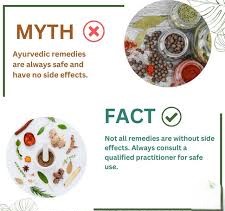Ayurvedic Remedies Safety has become a significant topic as more people turn to natural healing methods. While Ayurveda provides holistic solutions, understanding the safety and suitability of these remedies for different individuals is crucial. This article explores the benefits, risks, and research-backed insights to help you make informed decisions about Ayurvedic treatments.
What Are Ayurvedic Remedies?
Ayurvedic remedies include natural herbs, oils, and therapies aimed at balancing the body’s three doshas: Vata, Pitta, and Kapha. These remedies are designed to promote holistic well-being by addressing both the physical and mental aspects of health.
Benefits of Ayurvedic Remedies
- Natural Ingredients: Most remedies are derived from herbs like Ashwagandha, Turmeric, and Brahmi, known for their healing properties.
- Personalized Care: Treatments are customized based on individual body types (Prakriti).
- Address Root Causes: Unlike many modern medicines, Ayurveda focuses on the root cause of illnesses.
Are Ayurvedic Remedies Safe for Everyone?
While Ayurvedic remedies are natural, safety depends on various factors:
- Quality of Products
Ensure remedies are sourced from reputable manufacturers. Look for certifications like GMP (Good Manufacturing Practices) to avoid contamination. - Dosha-Specific Treatments
Remedies that suit one dosha might not work for another. Always consult an Ayurvedic practitioner before starting any treatment. - Underlying Conditions
Certain remedies may not be suitable for individuals with chronic illnesses like diabetes or heart conditions. - Drug Interactions
Ayurvedic herbs like Guggul or Triphala can interact with modern medicines, leading to side effects. - Pregnancy and Children
Pregnant women and children should avoid self-prescribing Ayurvedic remedies without expert advice.
Popular Ayurvedic Remedies and Their Safety
- Ashwagandha: Effective for stress relief but unsuitable for individuals with thyroid disorders.
- Turmeric: Anti-inflammatory but may cause stomach upset in high doses.
- Triphala: Aids digestion but can lead to dehydration if overused.
- Brahmi: Boosts cognitive function but should be avoided during pregnancy.
How to Use Ayurvedic Remedies Safely
- Consultation is Key
Always seek advice from a certified Ayurvedic doctor to ensure the remedy suits your body type. - Start with Small Doses
Introduce remedies gradually to monitor their effects. - Check for Allergies
Perform a patch test for topical remedies like oils or creams. - Research the Source
Only buy products from trusted brands with proper labeling and instructions.
Integrating Ayurveda with Modern Medicine
Combining Ayurveda with modern treatments can provide a holistic approach to health. However, this should only be done under the guidance of healthcare professionals to avoid adverse effects.

Conclusion
When considering Ayurvedic Remedies Safety, it’s essential to evaluate individual health conditions and consult qualified practitioners. While Ayurveda offers numerous benefits, not all remedies are universally safe. Research-backed evidence, such as studies on Ayurvedic formulations published on PubMed Central, can help you make informed decisions. By balancing traditional knowledge with modern research, you can enjoy the holistic benefits of Ayurveda safely.
Discover more about Ayurveda and its practices at Jeevan Jyoti Ayurveda’s Blog.
